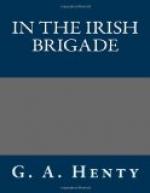“I shall press the matter strongly upon him, and point out the deep feeling that will be excited, throughout his Irish and Scotch troops, if nothing is done to save the prisoners.
“Louis is a politic monarch,” he said, “and, knowing our worth and that of his Scotch soldiers, I think that he will, on my representations, bestir himself. Wauchop has many times performed brilliant services, and deserves well of France. However, we shall see.”
When they were admitted to the audience, Lord Galmoy introduced the three soldiers of O’Brien’s regiment as coming that morning to Paris, having effected their escape from Newgate. As he repeated their names, the king looked sharply at Desmond.
“Ah, ah!” he said, “so our young ensign is in the thick of adventures again. These we will hear presently.
“Well, my lord, why have they come here so hurriedly after their arrival?”
“They came to inform Your Majesty that the English Government have determined to execute Colonel Francis Wauchop, and the twelve officers of their regiment who were on board the Salisbury, captured on the coast of Scotland.”
Desmond, who was watching the king’s face closely, saw that this was no news to him, and that he was annoyed by its being now brought to his notice; for doubtless the fate of a colonel, and a dozen young officers, was a matter that affected him little; and that, had the matter not been forced upon him, he would not have troubled about it, but, when it was too late, would have professed entire ignorance of the intentions of the English Government.
He only said, however, “It is incredible that there can be an intention to execute officers in our service, captured upon a warlike expedition.”
“It is but too true, sir. Against Colonel Wauchop they have no ground for severity. By the convention of Limerick, he and all other officers were formally permitted to enter Your Majesty’s service; but the young lieutenants have, of course, joined long since that time, and therefore cannot benefit by the terms of the convention; and could, with a show of justice, be executed as English subjects, traitors serving against their country.”
“We are afraid that our remonstrance would have but little effect with the English Government.”
Lord Galmoy smiled slightly, for it was notorious that negotiations had gone on between King James and his councillors, and several of the members of the English Ministry, Marlborough himself being more than suspected of having a secret understanding with the little court at Saint Germain.
He only said, however, “Your Majesty has in your hands the power of compelling the English Government to alter their determination in this matter.”
“How so, my lord?” the king asked, in much surprise.




